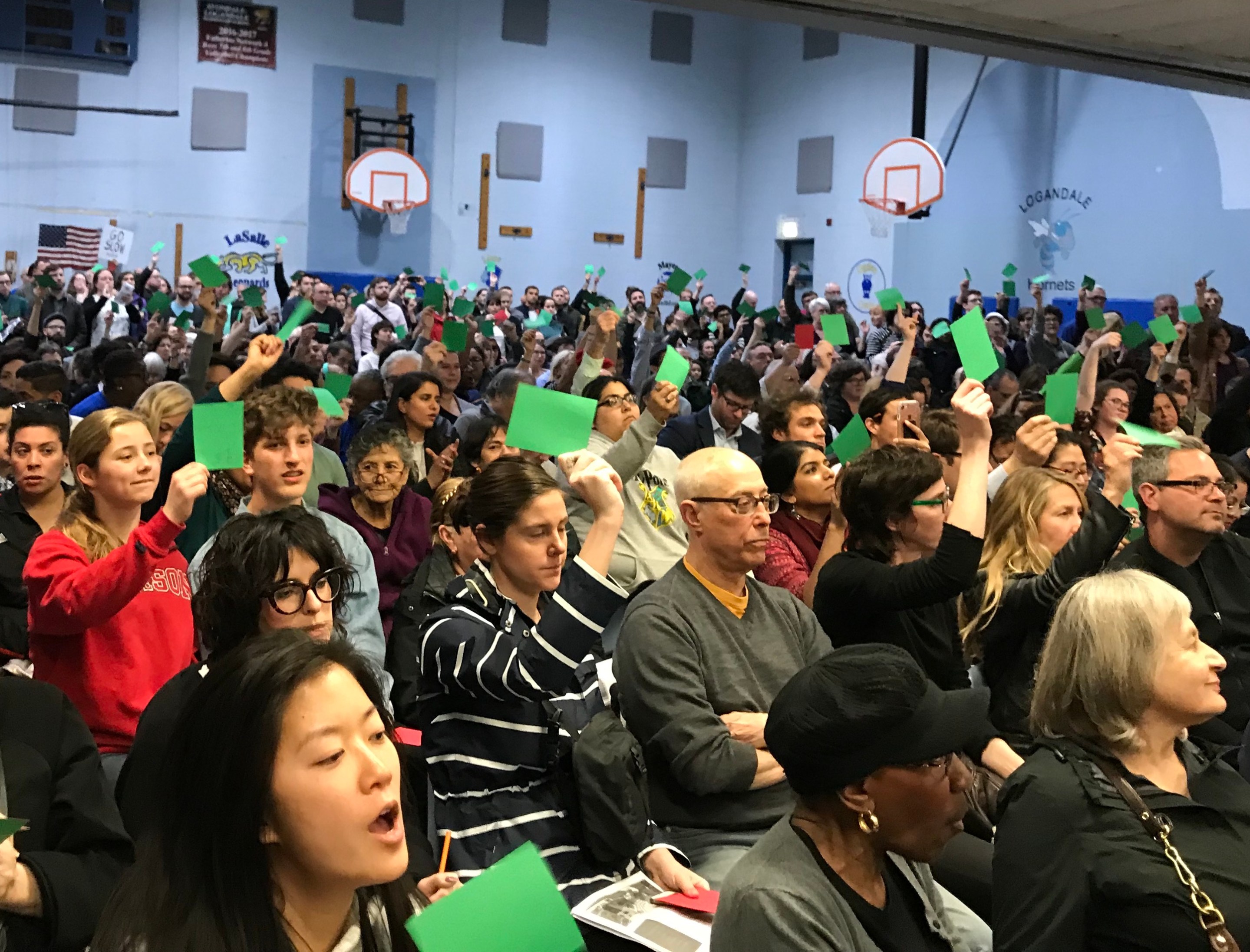Last night's community meeting on the proposed 100-unit, 100 percent affordable transit-oriented development by the Logan Square Blue Line station was a standing-room only event. Over 500 people showed up to Avondale-Logandale Elementary School to learn more about the controversial project, slated for a parking lot on Emmett Street, and make their opinions known. Alderman Carlos Ramirez-Rosa even asked able-bodied audience members to give up their seats to allow seniors and people with disabilities to sit. Emotions ran high during the two-hour hearing, with a large majority of residents expressing support for moving forward with the plan, but a vocal minority of neighbors speaking out against it.
At the start of the meeting, Rosa gave an overview of the proposal's history, starting with 2014 Metropolitan Planning Council workshops to brainstorm ideas for the site with residents. He then discussed the community-driven zoning process he developed with residents, experts, and organizations when he took office in 2015. “These are the guidelines and procedures we have used for every zoning change or development that requires my support to advance to the Chicago City Council."
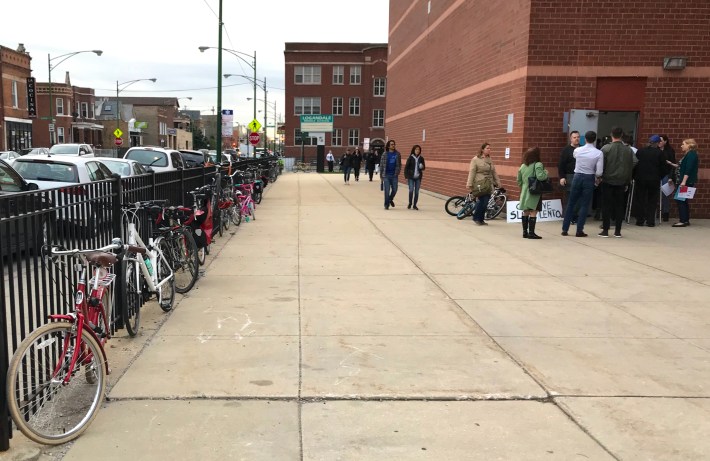
Under the 35th Ward community-driven zoning process, when a developer requests a zoning change, such as the one Bickerdike needs to build the TOD, the proposal is referred to community organizations that have asked to be involved. After the developer has been given feedback, a revamped proposal is presented at a community meeting. After taking office in 2015, in response to the community input from the MPC workshops, Rosa committed to making a 100-percent affordable development happen at the Emmett site.
Soon afterwards, Rosa said, he met with the Department of Planning and Development to discuss the project. DPD officials proposed making only 30 percent of the units affordable, and they didn't want to go any higher than 60 percent. When Rosa insisted on 100 percent, the officials said issuing a request for proposals for the development wouldn't make any sense, because no for-profit developers would be interested. They told him that the only way to achieve his goal was through a negotiated sale.
“For the record, no negotiated sale has taken place yet, no contract has been awarded, and I will only support the zoning change and negotiated sale and TIF funding that makes this proposal possible if it is found that this proposal has support from the community after the community input process,” Rosa said.
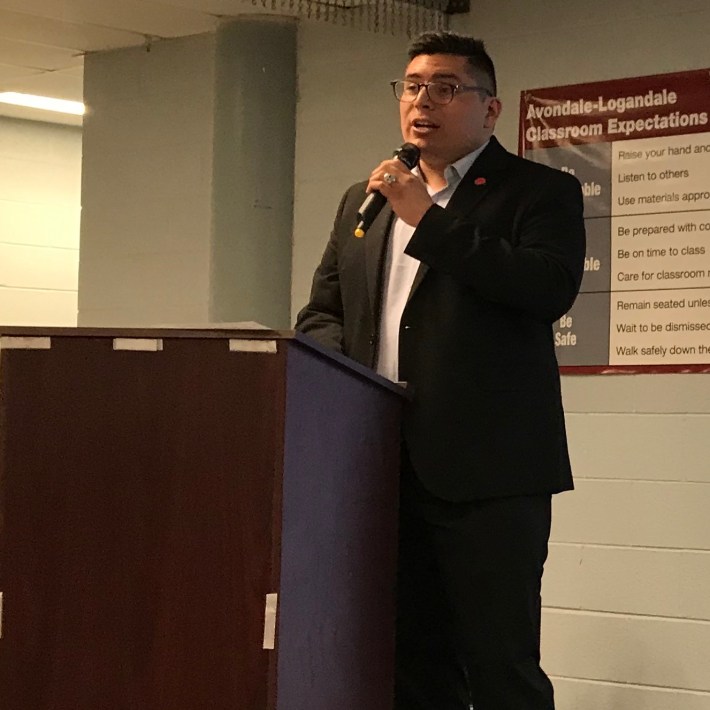
According to the alderman, nonprofit developer Bickerdike Redevelopment Corporation was the only developer that brought forth a proposal to build on the lot that also aligns with the priorities identified during the MPC workshops.
Bickerdike CEO Joy Aruguete offered more info on the Emmett Street proposal. As detailed on the proposal website, the 100 units are a mix of one-, two-, and three-bedroom units affordable to those making at or below 60 percent of the Chicago Area Median Income (AMI). The development will include meeting space for community groups, a rooftop garden, retail on Kedzie Avenue, and a plaza at the corner of Kedzie and Emmett. There will be onsite Bickerdike management staff and part-time security personnel.
The estimated timeline for the development projects that the zoning, negotiated sale, and building permit approval processes would be completed by the end of this year. Construction would start in January 2020 and be completed by December 2021. The building should be fully occupied by July 2022.
"This project will serve a lot of people who our city depends on every day," Aruguete said. "Our workers, our teachers, our city workers, people who work at our hospitals, people who serve our food, that is who this project is intended to serve."
Staff from Landon Bone Baker Architects gave a brief presentation on the design of the building before Rosa opened the floor up for statements and questions from residents. Audience members had been given green and red cards to hold up to voice aggreement or disagreement with the speakers.
Ashley Galvan Ramos of the Logan Square Neighborhood Association was the first to speak. “I support this project because I want to move back to my home and I want people to keep living in their communities and to have sustainable housing in Logan Square,” she said.
Mike Saelens, a Logan Square resident who lives a block away from Emmett Street, discussed how the development could benefit him as a retiree with a disability. “I’m on a fixed income and I live in a building that is currently not accessible. I think a project like this is definitely needed,” he said.
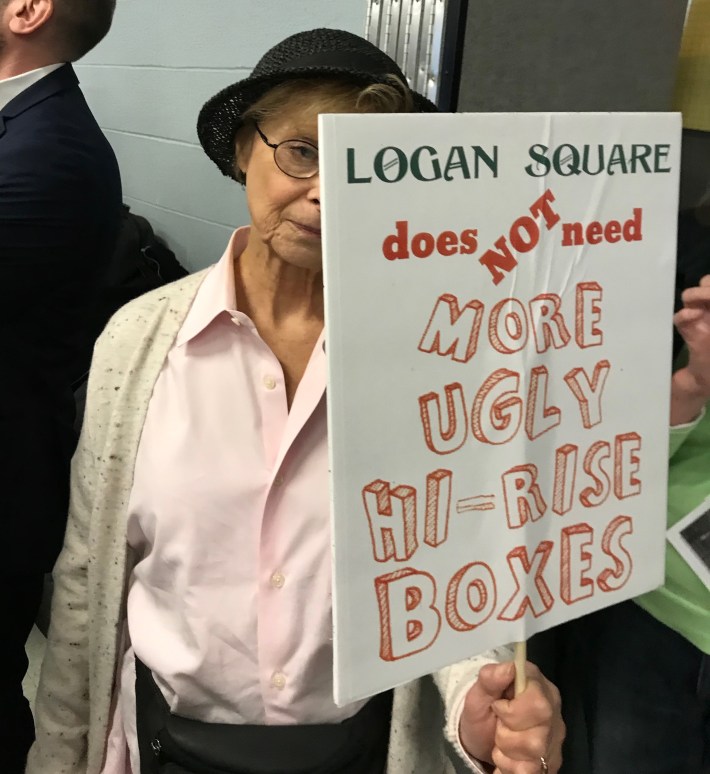
One of the first people to voice opposition was developer Mark Fishman, who has steeply raised rents in some of his buildings, pricing out longtime residents. Notably, Fishman evicted Rosa from his former ward office on Sawyer Avenue near Milwaukee Avenue. Fishman said he's disappointed that the development isn't mixed-use, and he feels that the precast concrete exterior won't fit in with other buildings in the Logan Square Boulevards historic district. “Concrete slab really doesn’t have anything to do with historical and that’s really one of my concerns,” he said.
Another concern residents brought up was whether there would be an open bid for the construction contract. Aruguete said there would be.
Others argued there wasn’t enough of a community input process for the proposal. “This is the same exact process we used for the Grace hotel development,” Rosa responded. “At that community input meeting, no one said it was rushed, no one said decisions had been made behind closed doors – people said this was great. Our community driven zoning process has been in place since 2015.” The alderman encouraged residents to get involved with community organizations in the zoning process, like the Logan Square Neighborhood Association and Logan Square Preservation, to be part of earlier stages of the planning.
Some residents complained that the development will make traffic worse, and argued that the 20 parking spots that will be included aren't enough to offset the loss of the Emmett lot. A Center for Neighborhood technology parking study found that the lot is usually only 30-percent full, and an MPC report stated that only 34 percent of households in nearby blocks own cars.
Logan Square resident John Tryneski had a poignant response to those objections. "I understand that neighbors have complaints about congestion, complaints that we don’t have enough Blue Line service," he said. "I would love to fight for more funding for CTA and better funding for transit. But if you’re asking us to choose cars and parking spaces over whether our neighbors can live in this community, in Logan Square, I will choose our neighbors every time." The audience cheered.
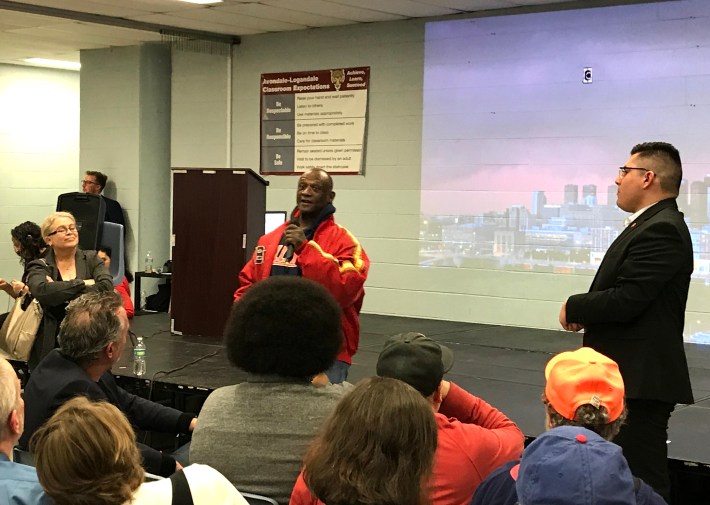
One property owner who lives near Emmett Street had a message for his wealthier neighbors. “Don’t be afraid of diversity. Don’t be afraid of us. Talk to us. Engage with us.”
The aldermen-elect of the neighboring 1st and 33rd Ward, Daniel LaSpata and Rossana Rodriguez Sanchez, respectively, also spoke in support of the project. “I want to bring projects like this to the 33rd Ward,” Rodriguez said. She noted that some of the opponents who want to see the approval process delayed carried "Go Slow" signs. “We can’t go slow because we don’t have time. We ran out of time a long time ago. Our communities are being devastated. Our people are being run out. Displacement is not going to wait."
However, one plan opponent argued that the building will do nothing to address Logan Square displacement. "This housing will not help Logan Square residents," she insisted. "This is going to go to everyone from all over Chicago." The crowd responded with a loud chorus of boos and waved their red cards.
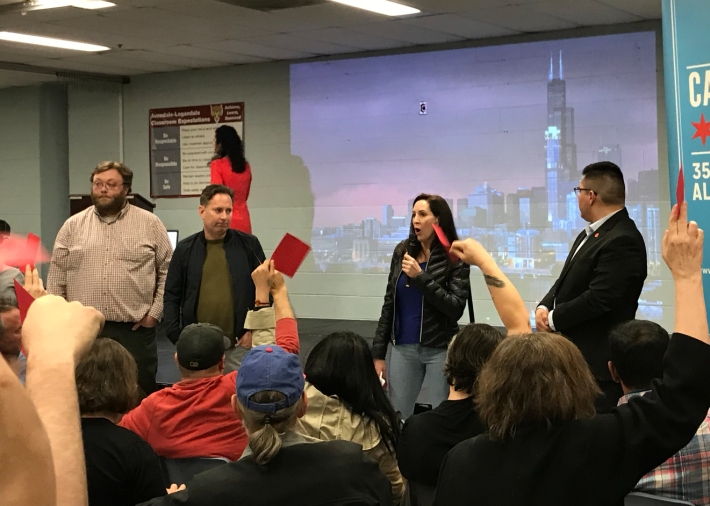
Aruguete responded that Bickerdike will comply with fair marketing laws. "But we also know from many years of experience, 51, that how we market these units makes a huge difference," she said. "We will be focusing our marketing for the Emmett Street project in the Logan Square area." She invited the woman to help out with spreading the word about the housing opportunity to local residents.
The last person to speak had one of the most memorable comments of the night. He addressed neighbors like Youngberg who are opposed to seeing 100 units of affordable housing on the site, which will help keep Logan Square economically and ethnically diverse. “If you don’t dig it, if you don’t like the diversity and all this change, go back to Schaumburg.”
Attendees were asked to fill out cards stating their position on the development. According to Bickerdike, of the 497 people who voted, 112 opposed the plan, 35 approved of it with certain conditions, and 350 unconditionally supported the proposal, or about a 78 percent total approval rate. Rosa will take two more weeks to collect input through other channels, and then voice his decision to the City Council zoning committee based on the feedback.
But judging from the overwhelmingly positive response at the meeting, it looks like this project to fight Logan Square displacement and improve transit access for working people will be proceeding full-steam ahead.
Correction 4/30/19: This piece mistakenly attributed comments made at the meeting to attendee Allison Huebert that were actually made by another opponent of the plan. Apologies for the mix-up.
